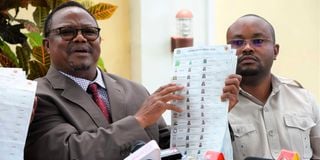
Tanzania presidential candidate Tundu Lissu shows an alleged fake ballot paper after a past election. PHOTO | THE CITIZEN |NMG
Tanzania has formally kicked off its preparations for local government elections in late October or early November, against the backdrop of opposition misgivings over the polls’ conduct by a government ministry instead of the electoral commission, despite recent law amendments.
The Ministry of Regional Administration and Local Government Authorities (Tamisemi), which operates under the President’s office, on June 15 published the long-awaited guidelines for the polls, which involves the election of chairpersons at village, ward, municipal and district levels, and convened a meeting of representatives from all 19 registered political parties in Dodoma to discuss the document.
Much of the discussion centred around opposition reservations over the prospect of civil servants being retained as poll supervisors under the contentious election law changes that were passed by parliament in February this year.
Opposition parties have said they prefer the civic poll to be handled by the newly renamed Independent National Electoral Commission (Inec) — formerly National Electoral Commission (Nec) — than Tamisemi, even as they also harbour questions about the commission’s make-up following the name change.
But Inec officials insist that the new law restricts the commission’s supervisory mandate only to the General Election for presidential and parliamentary seats which is scheduled for next year.
“A supporting law is needed to give us authority over the civic elections as well, but this has not yet been enacted by parliament. The absence of this law leaves that responsibility in the hands of Tamisemi,” Inec’s director of elections Ramadhani Kailima said on June 13.
Section 10(1)(c) of the Inec Act passed by Parliament in February empowers the commission to manage local government elections “using other laws which are still being awaited,” Mr Kailima said.
Inec, however, will be in charge of updating the national voters register for both the civic election and presidential and parliamentary ballot next year. The week-long update is set to be formally launched on July 1 in Kigoma, a western Tanzania region known to be home to many refugees from neighbouring countries Burundi and Democratic Republic of Congo and continue nationwide up to July 7.
It is estimated that the exercise will yield an 18.7 percent increase in eligible voter numbers from 29.75 million in 2020 to about 34.7 million while some names will be removed from the register due to death, losing their legal voting rights by renouncing their citizenship, or other reasons.
About 6,000 new Biometric Voter Registration (BVR) kits, programmed to the Android system instead of Windows on the old kits, will be deployed for the exercise. Inec has also set up an online voter registration system to allow previously registered citizens to update their personal details before visiting registration centres in person to obtain voter identification cards.
In the meantime, opposition parties led by ACT Wazalendo have questioned the retention of commissioners from the previous Nec in the new Inec, which they say goes against the principle of ‘independence’.
But according to Mr Kailima, calls for them to vacate their positions immediately have no legal basis under Section 27 of the Inec Act of 2024 which states that “once this law comes into effect, anyone who is the chairman, vice-chairman or member of the commission will continue to hold their positions until the end of their term.”
Under the civic election guidelines announced by Tamisemi, campaigns will be allowed to start just seven days before polling day.
Contesting political parties will also be required to submit their campaign schedules to the supervisory authority at least seven days before launching their campaigns.
Speaking during the Dodoma meeting on June 15, Chadema secretary-general John Mnyika proposed that instead of forcing the issue of public servants supervising the election, Tamisemi should allow any adult citizen to apply for the job and the contesting parties to raise objections over any appointments.
Mr Mnyika also called for the campaign period to be extended from seven to 14 days, saying this would be a more reasonable timeframe for parties and candidates to court voters.






